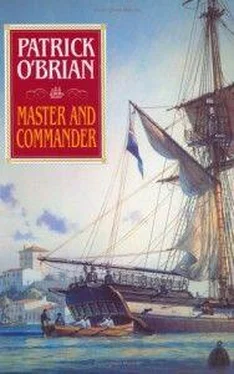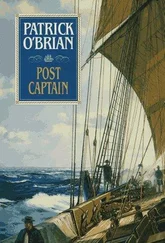'Probably more. It is eight or nine years since I was there,' said Stephen, 'so I will not be absolute; but the chapel on it withstands the tall waves in the winter storms.'
'Then it will certainly protect our hull. Now, with the sloop anchored with a spring on her cable so' – running his finger in a line from the battery to the rock and so to the spot – 'she should be tolerably safe. She opens as heavy a fire as she can, playing on the mole and over the tower. The boats from the snow and the settee land at the Doctor's cove' – pointing to a little indentation just round the south-west point – 'and we run as fast as ever we can along the shore and so take the tower from behind. Twenty yards short of it we fire the rocket and you turn your guns well away from the battery, but blaze away without stopping.'
'Me, sir?' cried James.
'Yes, you, sir; I am going ashore.' There was no answering the decision of this statement, and after a pause he went on to the detailed arrangements. 'Let us say ten minutes to run from the cove to the tower, and…'
'Allow twenty, if you please,' said Stephen. 'You portly men of a sanguine complexion often die suddenly, from un considered exertion in the heat. Apoplexy – congestion.'
'I wish, I wish you would not say things like that, Doctor,' said Jack, in a low tone: they all looked at Stephen with some reproach and Jack added, 'Besides, I am not portly.'
'The captain has an uncommon genteel figgar,' said Mr Marshall.
The conditions were perfect for the attack. The remains of the easterly wind would carry the Sophie in, and the breeze that would spring up off the land at about moon-rise would carry her into the offing, together with anything they managed to cut out. In his long survey from the masthead, Jack had made out the settee and a number of other vessels moored to the inner wall of the mole, as well as a row of fishing-boats hauled up along the shore: the settee was at the chapel end of the mole, directly opposite the guns of the tower, a hundred yards on the other side of the harbour.
'I may not be perfect,' he reflected, 'but by God I am not shy; and if we cannot bring her out, then by God I shall burn her where she lies.' But these reflexions did not last long. From the deck of the Neapolitan snow he watched the Sophie round Cape Almoraira in the three-quarter darkness and stand into the bay, while the two prizes, with the boats in tow, bore away for the point on the other side. With the settee already in the port there was no possibility of surprise for the Sophie, and before she anchored she would have to undergo the fire of the battery. If there was to be a surprise it would lie with the boats: the night was almost certainly too dark now for the prizes to be seen crossing outside the bay to land the boats in Stephen's cove beyond the point -'one of the few I know where the white-bellied swift builds her nest'. Jack watched her going with a tender and extreme anxiety, torn with longing to be in both places at once: the possibilities of hideous failure flooded into his mind – the shore guns (how big were they? Stephen had been unable to tell) hulling the Sophie again and again, the heavy shot passing through both sides – the wind falling, or getting up to blow dead on shore – not enough hands left aboard to sweep her out of range – the boats all astray. It was a foolhardy attempt, absurdly rash. 'Silence fore and aft,' he cried harshly. 'Do you want to wake the whole coast?'
He had had no idea how deeply he felt about his sloop: he knew exactly how she would be moving in – the particular creak of her mainyard in its parrel, the whisper of her rudder magnified by the sounding-board of her stern; and the passage across the bay seemed to him intolerably long.
'Sir,' said Pullings. 'I think we have the point on our beam now.'
'You are right, Mr Pullings,' said Jack, studying it through his night-glass. 'See the lights of the village going, one after the other. Port your helm, Algren. Mr Pullings,
send a good man into the chains: we should have twenty fathom directly.' He walked to the taffrail and called over dark water, 'Mr Marshall, we are standing in.' The high black bar of the land, sharp against the less solid darkness of the starry sky: it came nearer and nearer, silently eclipsing Arcturus, then the whole of Corona: eclipsing even Vega, high up in the sky. The regular splash of the lead, the steady chant of the man in the weather chains: 'By the deep nine; by the deep nine; by the mark seven; and a quarter five; a quarter less five…
Ahead lay the pallor of the cove beneath the cliff, and a faint white edge of lapping wave. 'Right,' said Jack, and the snow came up into the wind, her foresail backing like a sentient creature. 'Mr Pullings, your party into the launch.'
Fourteen men filed fast by him and silently over the side into the creaking boat: each had his white arm-band on.
'Sergeant Quinn.' The marines followed, muskets faintly gleaming, their boots loud on the deck. Someone was grasping at his stomach. It was Captain La Hire, a volunteer attached to the soldiers, looking for his hand. 'Good lucky,' he said, shaking it.
'Merci very much,' said Jack, adding, 'Mon captain,' over the side; and at that moment a flash lit the sky, followed by the deep thump of a heavy gun.
'Is that cutter alongside?' said Jack, his night-eyes half blinded by the flash.
'Here, sir,' said the voice of his coxswain just beneath him. Jack swung over, dropped down. 'Mr Ricketts, where is the dark lantern?'
'Under my jacket, sir.'
'Show it over the stern. Give way.' The gun spoke again, followed almost immediately by two together: they were trying for the range, that was sure: but it was a damned roaring great note for a gun. A thirty-six pounder? Peering round he could see the four boats behind him, a vague line against the loom of the snow and the settee. Mechanically he patted his pistols and his sword: he had rarely felt more nervous, and his whole being was concentrated in his right ear for the sound of the Sophie's broadside.
The cutter was racing through the water, the oars creaking as the men heaved, and the men themselves grunting deep with the effort – ugh, ugh. 'Rowed-off all,' said the coxswain quietly, and a few seconds later the boat shot hissing up the gravel. The men were out and had hauled it up before the launch grounded, followed by the snow's boat with Mowett, the jolly-boat with the bosun and the settee's launch with Marshall.
The little beach was crowded with men. 'The line, Mr Watt?' said Jack.
'There she goes,' said a voice, and seven guns went off, thin and faint behind the cliff.
'Here we are, sir,' cried the bosun, heaving two coils of one-inch line off his shoulder.
Jack seized the end of one, saying, 'Mr Marshall, clap on to yours, and each man to his knot.' As orderly as though they had been mustering by divisions aboard the Sophie, the men fell into place. 'Ready? Ready there? Then tear away.'
He set off for the point, where the beach narrowed to a few feet under the cliff, and behind him, fast to the knotted line, ran his half of the landing-party. There was a bubbling furious excitement rising in his chest the waiting was over this was the now itself. They came round the point and at once there were blinding fireworks before them and the noise increased tenfold: the tower firing with three, four deep red lances very low over the ground, the Sophie, her brailed-up topsails clear in the irregular flashes that lit up the whole sky, hammering away with a fine, busy, rolling fire, playing on the jetty to send stone splinters flying and discourage any attempt at warping the settee ashore. As far as he could judge from this angle, she was in exactly the position they had laid down on the chart, with the dark mass of the chapel rock on her port beam. But the tower was farther than he had expected. Beneath his delight – indeed, his something near a rapture – he could feel his body labouring, his legs heaving him slowly along as his boots sank into the soft sand. He must not, must not fall, he thought, after a stumble; and then again at the sound of a man going down on Marshall's rope. He shaded his eyes from the flashes, looked with an unbelievably violent effort away from the battle, ploughed on and on and on, – the pounding of his heart almost choking his mind, hardly progressing at all. But now suddenly it was harder ground, and as though he had dropped a ten-stone load he flew along, running, really running. This was packed, noiseless sand, and all along behind him he could hear the hoarse, gasping, catching breath of the landing-party. The battery was hurrying towards them at last, and through the gaps in the parapet he could see busy figures working the Spanish guns. A shot from the Sophie, glancing off the chapel rock, howled over their heads; and now an eddy in the breeze brought a choking gust of the tower's powder-smoke.
Читать дальше
Конец ознакомительного отрывка
Купить книгу












